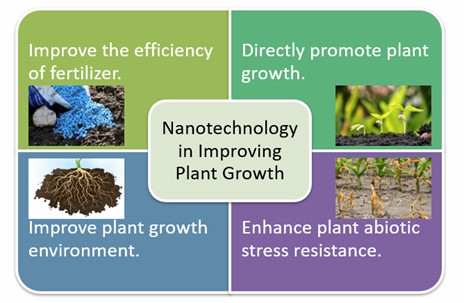Lifeasible specializes in applying nanotechnology to all aspects of plant protection and provides services to help research the application of nanotechnology in enhancing the growth status of plants.
Nanotechnology also has a variety of uses in improving plant growth. Nanotechnology can be used to control the release of fertilizers, thus improving the efficiency of fertilizer and enhancing the growth status of plants. Nanomaterials can directly improve the growth status of plants. The addition of TiO2 nanomaterials can promote soybean growth by altering the chlorophyll or carotene of soybeans. Then, nanomaterials can improve the soil structure and adsorb toxic heavy metals from the soil and water, which can improve plants' growth environment and facilitate the plant to remove heavy metals. In addition, nanomaterials can enhance the ability of plants to resist abiotic stress. For example, namo-SiO2 plays an important role in the resistance of plants to salinity and drought stress.
 Fig. 1 The role of nanotechnology in improving plant growth.
Fig. 1 The role of nanotechnology in improving plant growth.
Lifeasible offers a broad range of services to support the application of nanotechnology in improving plant growth. Below are our specific service directions.
Improving fertilizer efficiency by nanotechnology
We offer two small directions in using nanotechnology to improve fertilizer efficiency. One is the development of fertilizer nanomorphs to help explore the best application nanomorphs for fertilizers. The other is to develop auxiliary nanomaterials for controlling fertilizer release.
Developing nanomaterials to promote plant photosynthesis
We offer the development of nanomaterials that directly promote photosynthesis in plants, such as CeO2 and TiO2 nanomaterials. And we provide services to help explore the mechanisms by which these nanomaterials enhance plants' photosynthesis.
Developing nanomaterials for improving soil structure
We offer services to develop nanomaterials for improving soil structure. These nanomaterials we develop can make soils with good porosity, resulting in water and fertilizer retention, good air permeability, and suitable temperature.
Developing nanomaterials for removing the harmful effects of pollutants
We offer services to develop nanomaterials for removing the harmful effects of pollutants, especially heavy metals, from soil and water. These nanomaterials can be divided into two categories. The first category is to reduce the damage of pollutants to plants through direct adsorption, and the second is to assist plants in growing well in the presence of pollutants and to increase their uptake of pollutants. The second of these nanomaterials can be used in soil-improving using plants.
Developing nanomaterials for improving microbial composition
It was found that the application of nanomaterials to the soil affects the composition of soil microorganisms. Some of these changes in microbial composition are beneficial in promoting plant growth. We offer services to help develop such nanomaterials.
Developing nanomaterials for enhancing plants resistant to abiotic stress
Enhancing the ability of plants to grow in adverse environments is also powerful for plant protection. We offer the development of nanomaterials to improve the ability of plants to survive in environments such as heat, drought, salinity, flooding, and cold to help plants survive in difficult periods.
A good growth state of plants helps them to resist diseases to a certain extent. Lifeasible uses nanotechnology to help develop various types of nanomaterials that help plants grow. Please contact us to discuss customized services.
References
Lifeasible has established a one-stop service platform for plants. In addition to obtaining customized solutions for plant genetic engineering, customers can also conduct follow-up analysis and research on plants through our analysis platform. The analytical services we provide include but are not limited to the following:
Get Latest Lifeasible News and Updates Directly to Your Inbox
Mechanisms Regulating Plant Chloroplast Biogenesis
April 15, 2025